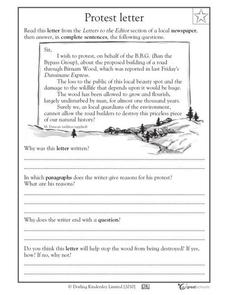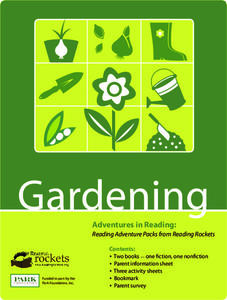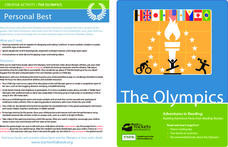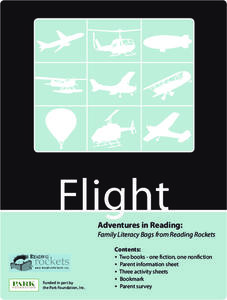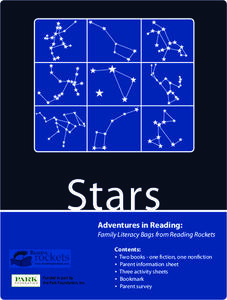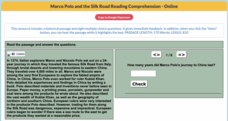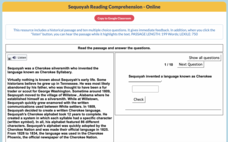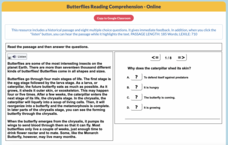Core Knowledge Foundation
Third Grade Skills Unit 11: Introduction to Ecology
The concluding skills unit offers learning opportunities and reviews in preparation for assessments. Scholars participate in lessons that examine spelling patterns, prefixes, suffixes, pronouns, and adjectives, draft a letter, and listen...
Core Knowledge Foundation
Third Grade Skills Unit 9: The Age of Exploration
The Age of Exploration is the theme of a unit designed to boost third-grade ELA skills. Scholars practice spelling patterns, examine words with prefixes and suffixes, build sentences with linking words, and use comparative and...
Core Knowledge Foundation
Third Grade Skills Unit 7: What’s in Our Universe?
Over four weeks, third graders participate in lessons that boost spelling, grammar, reading, and writing skills. Scholars explore spelling patterns, suffixes, singular and plural possessive nouns, quotations, and conjunctions....
Core Knowledge Foundation
Third Grade Skills Unit 4: Stories of Ancient Rome
A unit covering stories of Ancient Rome examines spelling rules, suffixes, verbs, quotation marks, writing, and dictionary skills. Lessons follow a similar routine; reading, skills practice, and extension activities, followed by...
Core Knowledge Foundation
Third Grade Skills Unit 5: Adventures in Light and Sound
Light and sound are the themes of a unit focused on third-grade skills. Scholars practice spelling patterns, grammar—adverbs, adjectives, synonyms, writing sentences with conjunctions, and listening and responding to read-aloud. Over...
Core Knowledge Foundation
Third Grade Skills Unit 3: How Does Your Body Work?
A skills unit combines ELA and science with lessons that explore the human body. Lessons begin with a reading, go into skills practice, and offer take-home materials. Skills practice includes listening to and discussing a read-aloud,...
Core Knowledge Foundation
Third Grade Skills Unit 2: Rattenborough’s Guide to Animals
An animal-themed unit focuses on third-grade skills. Scholars practice spelling patterns, prefixes, suffixes, and grammar concepts—nouns, verbs, adjectives, subjects, predicates, and sentences. Assessments gauge proficiency.
Common Sense Media
Talking Safely Online
What is the difference between online and real-life friendships? Pupils learn how to keep information private online and maintain their safety in various situations requiring online communication.
Common Sense Media
Digital Citizenship Pledge
Learners collaborate to create a set of group norms and expectations by which they will abide in order to promote a safe, respectful online community.
Curated OER
Protest Letter
What a fantastic resource to guide youngsters in persuasive letter writing. They read a brief letter to the editor and answer question about the author's purpose, word choice, and structure. Next, scholars draft their own letter by...
Education City
Black History Month
Enhance Black History Month with a twenty-page resource designed to boost scholars' knowledge of the great accomplishments made by African Americans. Learners take in fun facts about famous inventors such as George Washington Carver and...
PBS
Reading Adventure Pack: Gardening
A Reading Adventure Pack invites scholars to start gardening. Following a reading of two books—fiction and nonfiction—young green thumbs repurpose food containers to grow an herb garden in their kitchen, plant seeds in starter pots out...
PBS
Reading Adventure Pack: The Olympics
The mini Reading Adventure Pack takes a close look at the Olympics. After reading a fiction and nonfiction story, scholars research facts about the host country or a country of their choice participating in the games. The research...
PBS
Reading Adventure Pack: Heroes
Three creative activities follow reading a fiction and nonfiction book about heroes. Scholars build hero action figures out of clay for make-believe play, explain in written form how they show bravery, kindness, patience, thoughtfulness,...
PBS
Reading Adventure Pack: Flight
A Reading Adventure pack focuses on the invention of flight. After reading a fiction and nonfiction book, scholars take their newfound knowledge to design a one-passenger flying device, experiment with different types of paper airplanes...
PBS
Reading Adventure Pack: Rivers
A Reading Adventure Pack showcases a fiction and nonfiction book followed by a series of hands-on activities. First, learners widdle sticks to build a tiny raft, conduct sensory experiments, and create a rap or folk song about rivers and...
PBS
Reading Adventure Pack: Bees
A Reading Adventure pack explores the busy life of bees. After reading a fiction and nonfiction text, scholars complete three hands-on activities. Participants invent a robot that can do the work of bees, cheers to hardworking bees with...
PBS
Reading Adventure Pack: Stars
A Reading Adventure Pack explores the night sky. Reading Her Seven Brothers by Paul Goble and Find the Constellations by H.A. Rey begin the learning experience. Scholars craft a night sky mobile, go stargazing, and write a mythical story...
Mr. Nussbaum
Silk Road
Challenge pupils to read informational text about the Silk Road. Scholars then take their newfound knowledge to answer a mix of eight fill-in-the-blank and multiple-choice questions. Report details appear at the end.
Mr. Nussbaum
Sequoyah
Test scholars' comprehension with a 10-question interactive. Learners read a short informative text about Sequoyah, a Cherokee silversmith, who invented the language Cherokee Syllabary, then answer fill-in-the-blank and multiple-choice...
Mr. Nussbaum
Rainbows
Test scholars' reading comprehension skills with interactive practice. Learners read a short informative text about rainbows, then answer eight multiple-choice questions. A report details their progress after the exercise is complete.
Mr. Nussbaum
Butterfly
An interactive challenges scholars to read a short informational text about butterflies then answer eight questions. A progress report appears after the last question.
Mr. Nussbaum
Christopher Columbus
Scholars use their reading comprehension skills to answer questions about a short informative text regarding Christopher Columbus. A progress report follows eight questions—multiple-choice and fill-in-the-blank.
Mr. Nussbaum
Buffalo
Scholars read or listen to an informational text about buffalos, then answer 10 questions—a progress report details participants' work.











